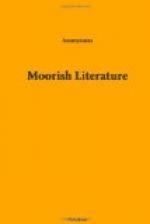His followers all he bade them dress in
Christian array,
With rude and rustic mantles of color
bright and gay;
With silken streamers in their caps, their
caps of pointed crown,
With flowing blouse, and mantle and gaberdine
of brown.
But he himself wore sober robes of white
and lion gray,
The emblems of the hopeless grief in which
the warrior lay.
And the thoughts of Adalifa, of her words
and glancing eyes,
Gave colors of befitting gloom to tint
his dark disguise.
And he came with purpose to perform some
great and glorious deed,
To drive away the saddening thoughts that
made the bosom bleed.
“For in
the widest prison-house is misery to me,
And the stoutest
heart is broken unless the arm be free.”
There streams into Granada’s gate
a stately cavalcade
Of prancing steeds caparisoned, and knights
in steel arrayed;
And all their acclamations raise, when
Celin comes in sight—
“The foremost in the tournament,
the bravest in the fight”—
And Moorish maiden Cegri straight to the
window flies,
To see the glittering pageant and to hear
the joyous cries.
She calls her maidens all to mark how,
from misfortune free,
The gallant Celin comes again, the ladies’
knight is he!
They know the story of his fate and undeserved
disgrace,
And eagerly they gaze upon the splendor
of his face.
Needs not his exploit in the fields, his
valorous deeds to tell—
The ladies of Granada have heard and know
them well!
“For in
the widest prison-house is misery to me,
And the stoutest
heart must break unless the warrior’s arm be
free.”
The beauty of Granada crowds Elvira’s
gate this night;
There are straining necks and flushing
cheeks when Celin comes in sight;
And whispered tales go round the groups,
and hearts indignant swell,
As they think what in Granada that hero
knight befell.
Now a thousand Moorish warriors to Celin’s
fame aspire,
And a thousand ladies gaze on him with
passionate desire.
And they talk of Adalifa, to whom he made
his vow,
Though neither speech nor written page
unites them longer now.
“For in
the widest prison-house is misery to me,
And the stoutest
heart must break unless the warrior’s arms be
free.”
The city waits his coming, for the feast
has been prepared,
By rich and poor, by high and low the
revel shall be shared;
And there are warriors high in hope to
win the jousting prize,
And there are ladies longing for a smile
from Celin’s eyes.
But when the news of gladness reached
Adalifa’s ear,
Her loving heart was touched with grief
and filled with jealous fear;
And she wrote to Celin, bidding him to
hold no revel high,
For the thought of such rejoicing brought
the tear-drop to her eye;
The Moor received the letter as Granada
came in sight,
And straight he turned his courser’s
head toward Jaen’s towering height,
And exchanged for hues of mourning his
robe of festal white.
“For in
the widest prison-house is misery to me,
And the stoutest
heart is broke unless the warrior’s arm be free.”




